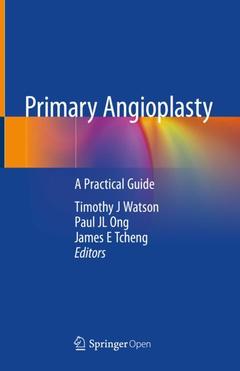Primary Angioplasty, 1st ed. 2018 A Practical Guide
Coordonnateurs : Watson Timothy J, Ong Paul JL, Tcheng James E

This quick-reference handbook offers a concise and practical review of key aspects of the treatment of ST-segment elevation myocardial infarction (STEMI) in the era of primary percutaneous coronary intervention (PPCI). In the context of STEMI, PPCI is the preferred mode of emergency revascularization. Access to PPCI is rapidly increasing and is now routinely practiced in both general and specialist hospitals and there has been a recent emphasis on developing STEMI networks to enhance and expedite the referral pathway. This coupled with concurrent developments to enhance the safety and efficacy of the PPCI procedure has heralded an era where STEMI interventions are increasingly considered an important subspecialty within interventional cardiology.
Written by leading cardiologists who have been instrumental in the adoption of PPCI in their respective institutions, the book provides junior and senior cardiologists alike with insightful and thought-provoking tips and tricks to enhance the success of PPCI procedures, which may in turn translate into direct improvements in outcomes. The book is also relevant for healthcare providers and emergency department physicians.
Dr. Timothy Watson is a board certified interventional cardiologist with a keen interest in novel technologies and research. He qualified at the University of London and completed his internship and residency in various hospitals in London and across the West Midlands region. After becoming a member of the Royal College of Physicians of London, he joined a clinical research training programme where he led a study investigating mechanisms of blood clot formation in atrial fibrillation, a common irregular heartbeat which can increase the risk of stroke. For this work, he has been awarded a Doctor of Medicine (MD) degree from the University of Birmingham. Dr. Watson trained in general and interventional cardiology, primarily at Addenbrooke's and Papworth Hospitals in Cambridge. He has subsequently undertaken a fellowship in interventional and structural cardiology at the renowned Green Lane Cardiovascular Unit in Auckland, New Zealand, where he has been involved in various first-in-human studies using exciting and novel technologies, some of which are now being introduced into clinical mainstream practice. He has worked as a consultant (interventional) cardiologist in New Zealand, Malaysia and in Singapore. In addition to his work as a clinical cardiologist, he continues to undertake various research projects as an investigator and maintains active research collaborations with the University of Auckland.
Dr. Paul Ong graduated from the University of Cambridge. He has been a member of the Royal College of Physicians since 1996 and has been a fellow of Royal College of Physicians (FRCP) in London and fellow of the European Society of Cardiology (FESC) since 2008. He completed his early medical training in some of the most prestigious London teaching hospitals. Dr. Ong completed his cardiology specialist training in NW Thames, gaining dual accreditation in cardiology and general medicine. He was award
Focuses entirely on primary PCI based on latest evidence and guidelines
Covers key topics from pre-hospital, emergency department and interventional catheter laboratory point-of-view
Chapters are structured in a step-by-step approach covering the topics as per the patient’s journey from symptom onset to diagnosis to treatment
Date de parution : 07-2018
Ouvrage de 338 p.
15.5x23.5 cm
Disponible chez l'éditeur (délai d'approvisionnement : 15 jours).
Prix indicatif 52,74 €
Ajouter au panierDate de parution : 01-2019
Ouvrage de 338 p.
15.5x23.5 cm
Disponible chez l'éditeur (délai d'approvisionnement : 15 jours).
Prix indicatif 52,74 €
Ajouter au panier


